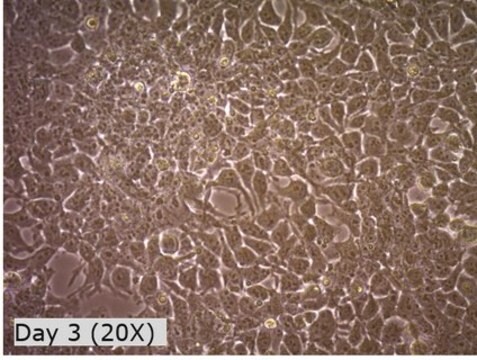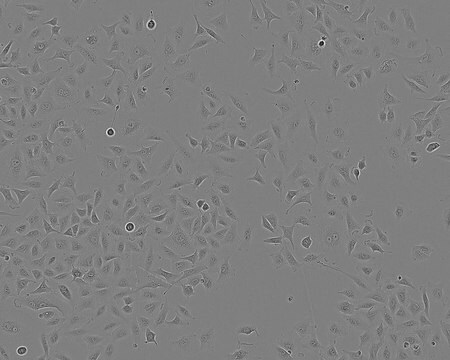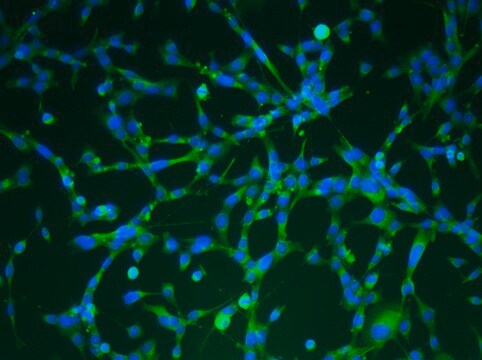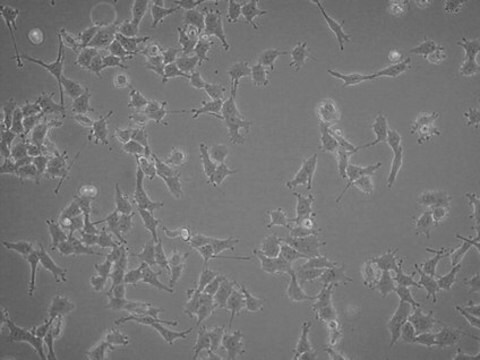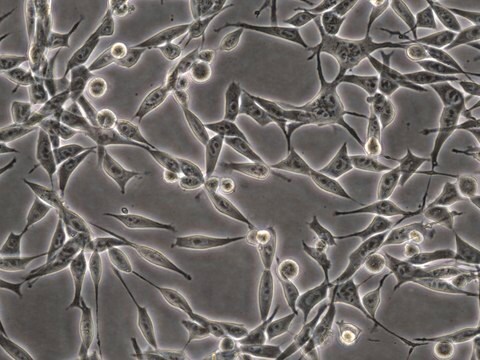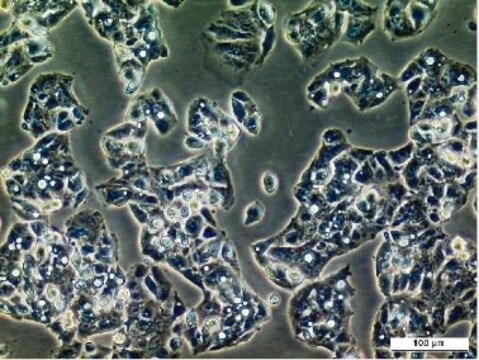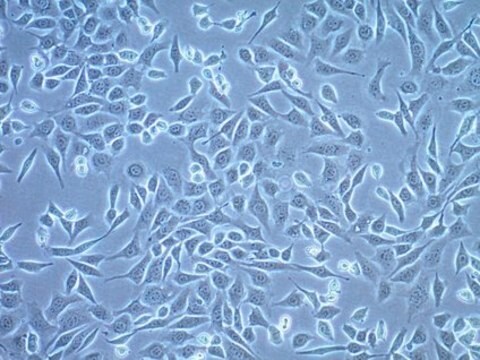SCC234
YUMM2.2 Mouse Melanoma Cell Line
Mouse
Synonym(s):
Yale University Mouse Melanoma 2.2 cell line, Yale University Mouse Melanoma cell line
Sign Into View Organizational & Contract Pricing
All Photos(5)
About This Item
UNSPSC Code:
41106514
NACRES:
NA.81
Recommended Products
Product Name
YUMM2.2 Mouse Melanoma Cell Line,
biological source
mouse
Quality Level
packaging
vial of ≥1x10^6 vial
manufacturer/tradename
Millipore
technique(s)
cell culture | mammalian: suitable
shipped in
liquid nitrogen
storage temp.
−196°C
General description
The YUMM (Yale University Mouse Melanoma) cell lines were developed as models that recapitulate genetic drivers found in a significant proportion of human melanomas. YUMM2.2 cells are syngeneic with the immunocompetent C57Bl/6 mouse background.
Application
- Each vial contains > 1X106 viable cells.
- YUMM2.2 cells are tested negative for infectious diseases by a Mouse Essential CLEAR panel by Charles River Animal Diagnostic Services.
- Cells are verified to be of mouse origin and negative for interspecies contamination from rat, chinese hamster, Golden Syrian hamster, human and nonhuman primate (NHP) as assessed by a Contamination CLEAR panel by Charles River Animal Diagnostic Services.
- Cells are negative for mycoplasma contamination.
Features and Benefits
The YUMM cell lines recapitulate genetic drivers found in many human melanomas. YUMM2.2 harbors a mutation that accelerates Braf/Pten-driven melanoma tumorigenesis and inactivates wt Pten and Cdkn2a.
Target description
The hope for immune-based therapies in cancer and recent progress in successful application of these approaches has focused research on the necessity for immunocompetent models to assess immune system responses to cancer cells. Immunocompetent genetically-engineered mouse models harboring discrete genetic drivers of melanoma are essential for studying potential immunotherapies, but are limited by the need to maintain colonies of multiple genotypes necessary to generate mouse models with appropriate genetic backgrounds.The YUMM2.2 cell line harbors a stabilized beta-catenin allele from excision of exon 3, a mutation that accelerates Braf/Pten-driven melanoma tumorigenesis, enhances metastasis, and controls tumor differentiation. Exon 3 excision is analogous to human beta-catenin stabilizing mutations found in human melanomas.SourceThe YUMM2.2 mouse melanoma cell line was derived from a 4-hydroxytamoxifen-induced melanoma tumor in a male C57BL/6 mouse into which mutations from the Braf/Pten genetically engineered mouse model had been introduced via backcrossing. References:1. Meeth K et al. (2016) The YUMM lines: a series of congenic mouse melanoma cell lines with defined genetic alterations. Pigment Cell Melanoma Res 29(5): 590-597.2. Dankort D et al. (2009) Braf(V600E) cooperates with Pten loss to induce metastatic melanoma. Nat Genet. 41(5): 544-552.
Storage and Stability
YUMM2.2 cells should be stored in liquid nitrogen until use. The cells can be cultured for at least 10 passages after initial thawing without significantly affecting cell marker expression and functionality.
Other Notes
This product is intended for sale and sold solely to academic institutions for internal academic research use per the terms of the “Academic Use Agreement” as detailed in the product documentation. For information regarding any other use, please contact licensing@milliporesigma.com.
Disclaimer
Unless otherwise stated in our catalog or other company documentation accompanying the product(s), our products are intended for research use only and are not to be used for any other purpose, which includes but is not limited to, unauthorized commercial uses, in vitro diagnostic uses, ex vivo or in vivo therapeutic uses or any type of consumption or application to humans or animals.
Storage Class Code
12 - Non Combustible Liquids
WGK
WGK 2
Flash Point(F)
Not applicable
Flash Point(C)
Not applicable
Certificates of Analysis (COA)
Search for Certificates of Analysis (COA) by entering the products Lot/Batch Number. Lot and Batch Numbers can be found on a product’s label following the words ‘Lot’ or ‘Batch’.
Already Own This Product?
Find documentation for the products that you have recently purchased in the Document Library.
Our team of scientists has experience in all areas of research including Life Science, Material Science, Chemical Synthesis, Chromatography, Analytical and many others.
Contact Technical Service